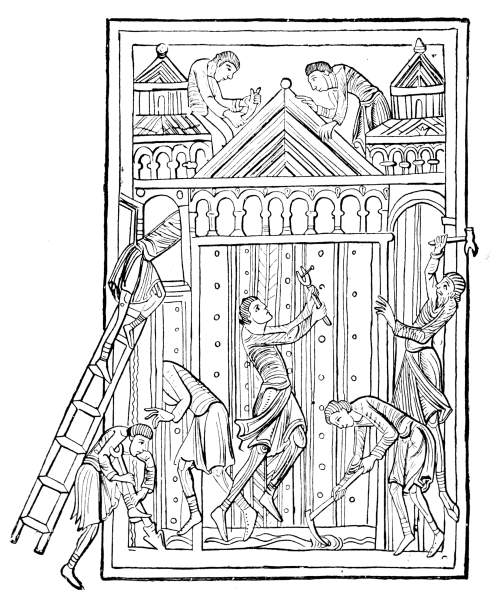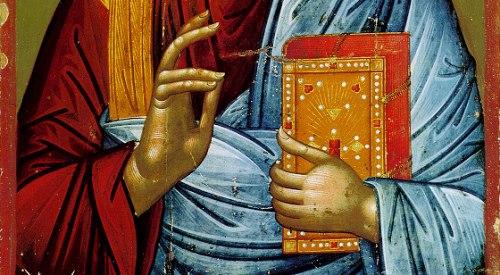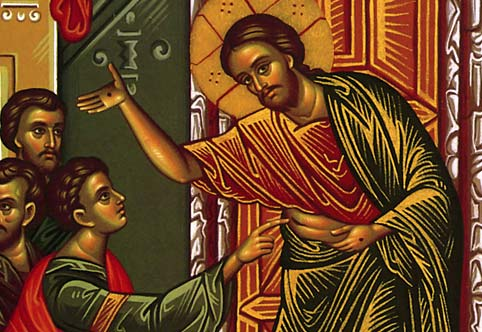Christ is Risen!
The First Sunday after Pascha
Sunday of Thomas the Apostle
St. George the Victory Bearer

The Sunday of Thomas the Apostle
Though the doors were shut at the dwelling where the disciples were gathered for fear of the Jews on the evening of the Sunday after the Passover, our Saviour wondrously entered and stood in their midst, and greeted them with His customary words, “Peace be unto you.” Then He showed unto them His hands and feet and side; furthermore, in their presence, He took some fish and a honeycomb and ate before them, and thus assured them of His bodily Resurrection.
But Thomas, who was not then present with the others, did not believe their testimony concerning Christ’s Resurrection, but said in a decisive manner, “Except I shall see in His hands the print of the nails, and put my finger into the print of the nails, and thrust my hand into His side, I will not believe.”
Wherefore after eight days, that is, on this day, when the disciples were again gathered together and Thomas was with them, the Lord Jesus came while the doors were shut, as He did formerly. Standing in their midst, He said, “Peace be unto you”; then He said to Thomas, “Bring hither thy finger, and behold my hands; and bring hither thy hand, and thrust it into My side: and be not unbelieving, but believing.”
And Thomas, beholding and examining carefully the hands and side of the Master, cried out with faith, “My Lord and my God.” Thus he clearly proclaimed the two natures – human and divine – of the God-man (Luke 24:36-49; John 20:19-29).
This day is called Antipascha (meaning “in the stead of Pascha,” not “in opposition to Pascha”) because with this day, the first Sunday after Pascha, the Church consecrates every Sunday of the year to the commemoration of Pascha, that is, the Resurrection.
Read more on the Greek Orthodox Archdiocese website.
Who is St. George?

St. George the Victory Bearer
The Holy Great Martyr George the Victory-Bearer, was a native of Cappadocia (a district in Asia Minor), and he grew up in a deeply believing Christian family. His father was martyred for Christ when George was still a child. His mother, owning lands in Palestine, moved there with her son and raised him in strict piety.
When he became a man, Saint George entered into the service of the Roman army. He was handsome, brave and valiant in battle, and he came to the notice of the emperor Diocletian (284-305) and joined the imperial guard with the rank of comites, or military commander.
The pagan emperor, who did much for the restoration of Roman might, was clearly concerned with the danger presented to pagan civilization by the triumph of the Crucified Savior, and intensified his persecution against the Christians in the final years of his reign. Following the advice of the Senate at Nicomedia, Diocletian gave all his governors full freedom in their court proceedings against Christians, and he promised them his full support.
Saint George, when he heard the decision of the emperor, distributed all his wealth to the poor, freed his servants, and then appeared in the Senate. The brave soldier of Christ spoke out openly against the emperor’s designs. He confessed himself a Christian, and appealed to all to acknowledge Christ: “I am a servant of Christ, my God, and trusting in Him, I have come among you voluntarily, to bear witness concerning the Truth.”
“What is Truth?” one of the dignitaries asked, echoing the question of Pontius Pilate. The saint replied, “Christ Himself, Whom you persecuted, is Truth.”
Read the entire biography on the Orthodox Church of America website.
Building St. Peter’s

Many, many thanks to all who worked so diligently to make our Lent and Pascha what it was. Orthodoxy is work but it is the kind of work that endures; the necessary work that allows us to move closer to Christ and experience Him in ways that transform us and the world around us.
That’s why we do it. The Church the Apostle Paul says is the “pillar and ground of the truth” — ground zero, the place where we can encounter Christ and learn His voice to be able to recognize Him when He meets us outside of it.
All of us have gifts given to us by God. Our job is to discern what they are and develop them. These gifts are not for us but for our neighbor — for our neighbor’s good and edification — although when we use them in these ways we discover real meaning and joy. We begin to comprehend the reason we are alive and what we were put on the earth to do.
No job is too small. The parts make the whole. When we live this way, Christ lives in us and His Church becomes His habitation, His house, His body. This too is what people who are looking for him will experience (they will sense Christ is present) and this experience is their confirmation that they too have finally found their home.
If we remain faithful to Christ in this way, our Lord will meet our needs and will also provide for us when it is time to build our permanent structure.
Christ is Risen!
Calendar At A Glance
- April 23 (Sunday) Thomas Sunday
- April 30 (Sunday) Memorial for Helen Deligiannis by Frank and Sarah Pyrsson
Wisdom From The Elders
The Divine Scripture says: ‘God said to Adam: Adam, where art thou?’ (Gen. 3:9). Why did the Creator of all things say this? Of course, it was in order to dispose Adam to come to his senses, to acknowledge his sin and repent. This is why He said, “Adam, where art thou?” As it were he said, “Adam, enter into yourself, acknowledge your nakedness and understand what a garment and what a glory you have lost. Adam where are you?”
St. Symeon the New Theologian
We carry within us the sins of remembrance of wrongs, and bitterness, and hate, and greed, and so many other things which kill the life of the spirit in us and do not allow us to live now, in the present time – the eternal life, which is simply life in the full meaning of the word, life in its fullness.
Metropolitan Anthony of Sourozh
Cultivate your devoutness and your modesty as much as you can.This will help you receive the Grace of God. For, if someone is devout and spiritually modest and humble too, he can expect to receive divine Grace. If he has no devoutness and no humility, the Grace of God does not come to him.
St. Paisios of Mount Athos
The only valuables on earth are good works done for Christ: these win us the grace of the Holy Spirit.
St. Seraphim of Sarov
People tend to think, “Let someone else take care of the problem, I’ll just do my own work.” But why don’t you take care of it, since you were the first to notice? That is what worldly people who do not believe in God do. I have no use for such a life; I would rather die a thousand deaths. The goal is for each one of us to think of the other person, of the other person’s pain.
St. Paisios of Mount Athos
Remember in Your Prayers
Carol Ann
Matthew
Gerhard
Valerie
Nancy
Chrysostom
Tim
Ron
Ivy-Jean
Pat
Christina
Baby Samuel
Jennie
Mary
Baby Kyriake
Maximos
Marian
Photini
Nicholas
Brad William
Ryan
Sarah
Robert Jarvis
Petronia (Wife of Phil Pappas)
Anna Marie Smith Baker
Iris Kuring (Bettina Zifiris' mother)
Constantine Houpis
Ron Chromulak
Beverly Chromulak
Katerina
Dianne
Loucine Kassis
Mary Kassis
Baby Maximus
Annette Star
Christine
Maria
Claire Livaditis
Eva Chandilles
Baby Dani
Scott Nedoff
Anthony Mourgis
John Hansen
Constandina James
James Hord
Bob Smith
Tom and Jean, parents of Patty and Jerry.
How should we pray for the sick? Remember them daily. Say their names (first names are sufficient) and ask God to bestow mercy and grace on them.
Add or remove names and print this list for easy reference during your prayer time on the St. Peter website.
Sunday Readings

Epistle
The righteous shall rejoice in the Lord.
Hear my voice, O God.
The Reading from the Acts of the Apostles. (12:1-11)
In those days, Herod the king laid violent hands upon some who belonged to the church. He killed James the brother of John with the sword; and when he saw that it pleased the Jews, he proceeded to arrest Peter also. This was during the days of Unleavened Bread. And when he had seized him, he put him in prison, and delivered him to four squads of soldiers to guard him, intending after the Passover to bring him out to the people. So Peter was kept in prison; but earnest prayer for him was made to God by the Church.
The very night when Herod was about to bring him out, Peter was sleeping between two soldiers, bound with two chains, and sentries before the door were guarding the prison; and behold, an angel of the Lord appeared, and a light shone in the cell; and he struck Peter on the side and woke him, saying, “Get up quickly.” And the chains fell off his hands. And the angel said to him, “Wrap your mantle around you and follow me.” And he went out and followed him; he did not know that what was done by the angel was real, but thought he was seeing a vision. When they had passed the first and the second guard, they came to the iron gate leading into the city. It opened to them of its own accord, and they went out and passed on through one street; and immediately the angel left him.
And Peter came to himself, and said, “Now I am sure that the Lord has sent his angel and rescued me from the hand of Herod and from all that the Jewish people were expecting.”
Gospel
For Thomas Sunday
The Reading from the Holy Gospel according to St. John. (20:19-31)
On the evening of that day, the first day of the week, the doors being shut where the Disciples were, for fear of the Jews, Jesus came and stood among them and said to them, “Peace be with you.” When He had said this, He showed them His hands and His side. Then the Disciples were glad when they saw the Lord. Jesus said to them again, “Peace be with you. As the Father has sent me, even so I send you.” And when He had said this, He breathed on them, and said to them, “Receive the Holy Spirit. If you forgive the sins of any, they are forgiven; if you retain the sins of any, they are retained.” Now Thomas, one of the Twelve, called the Twin, was not with them when Jesus came. So the other Disciples told him, “We have seen the Lord.” But he said to them, “Unless I see in His hands the print of the nails, and place my finger in the mark of the nails, and place my hand in His side, I will not believe.”
Eight days later, His Disciples were again in the house, and Thomas was with them. The doors were shut, but Jesus came and stood among them, and said, “Peace be with you.” Then He said to Thomas, “Put your finger here, and see My hands; and put out your hand, and place it in my side; do not be faithless, but believing.” Thomas answered Him, “My Lord and my God!” Jesus said to him, “Have you believed because you have seen Me? Blessed are those who have not seen and yet believe.” Now Jesus did many other signs in the presence of the Disciples, which are not written in this book; but these are written that you may believe that Jesus is the Christ, the Son of God, and that believing you may have life in His Name.


